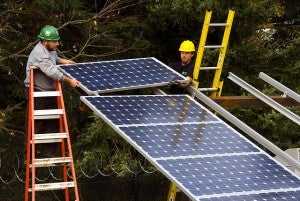 At the start of the 2015 Illinois legislative session, a diverse coalition came together to introduce and support the Illinois Clean Jobs bill – legislation which would strengthen Illinois’ energy efficiency policies, as well as update and extend the state’s Renewable Portfolio Standard (RPS). The bill would also create a market-based strategy to meet new federal carbon regulations to limit carbon emissions from existing power plants, otherwise known as the Clean Power Plan (CPP).
At the start of the 2015 Illinois legislative session, a diverse coalition came together to introduce and support the Illinois Clean Jobs bill – legislation which would strengthen Illinois’ energy efficiency policies, as well as update and extend the state’s Renewable Portfolio Standard (RPS). The bill would also create a market-based strategy to meet new federal carbon regulations to limit carbon emissions from existing power plants, otherwise known as the Clean Power Plan (CPP).
So now that the regular legislative session has ended, where does the Clean Jobs bill stand?
A victory for the little guy
Initially, the Clean Jobs bill was far from the energy legislation spotlight. Two deep-pocketed companies also introduced bills. Exelon proposed a bailout for three of its uneconomic nuclear reactors. And Commonwealth Edison (ComEd) wanted to restructure its rates to ensure a profit because efficiency and clean energy had reduced the demand for power.
Most political observers felt Exelon and ComEd – which employ teams of lobbyists and enjoy substantial political clout – would quickly obtain what they asked for. Yet neither went anywhere, and it was actually the Clean Jobs legislation that obtained more co-sponsors than the Exelon and ComEd bills – combined.
Despite delay, support remains high
None of the energy bills passed because several factors encouraged legislators to postpone consideration of energy legislation until the veto session in the fall. Most prominent, Illinois is currently facing a $3 billion budget deficit, and budget discussions have taken the wind (pardon the pun) out of Clean Jobs and other energy bills – for now. Some politicians also wanted to wait until after the release of the final CPP late this summer.
Yet we remain optimistic. The Clean Jobs bill would provide thousands of renewable energy jobs, lower electricity bills through increased energy efficiency, and use money saved to invest in initiatives like workforce development, low-income bill assistance, and research and development of new clean energy technology. It presents an economic opportunity that would benefit the state, people’s pocketbooks, and the environment.
For this reason, the bill has reached across the aisle and seen support from a wide array of groups, including faith-based, business, environmental, and labor organizations. Leaders from all of these areas even formed the official Illinois Clean Jobs Coalition to endorse the legislation – of which Environmental Defense Fund is a proud member. 26 sponsors in the Illinois Senate and 58 sponsors in Illinois’ House are behind the bill, demonstrating the bipartisan appeal. Mayor Rahm Emanuel is on board and even Chicago high school students have banded together to voice their desire to see the measure pass.
Despite the lag in timing, the intense display of support “puts us way ahead of where we have been in these discussions in the past,” said Rep. Elaine Nekritz (D-Northbrook). She created the bill along with Sen. Don Harmon (D-Oak Park).
The Clean Power Plan and Illinois
The Environmental Protection Agency (EPA) intends to release the final CPP regulations in August. The plan, as proposed, allows states maximum flexibility to craft an implementation plan that will take advantage of state-specific resources.
Thanks to previous moves to advance clean energy in the state, Illinois is already more than 75 percent of the way to meeting the 2020 benchmarks. The Clean Jobs bill directs the Illinois EPA to develop a market-based approach to meeting the requirements, ensuring the state can easily achieve the remaining reductions.
Thanks to the thousands of EDF members who have asked their legislators to co-sponsor and advance the Clean Jobs legislation. We have momentum on our side for Illinois to be a leader in energy efficiency and clean energy, and to craft a CPP implementation plan most beneficial to our state.
Photo source: Flickr/Oregon DOT









